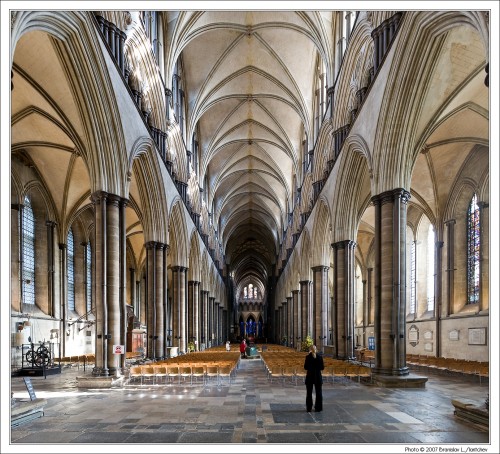To Salisbury and the funeral of the mother of two friends.
The venue is the cathedral, no less. We get there in good time, but not good enough: the place is almost full and we forage for a seat at the back.
Who’s the celeb who died, you ask. No one you’ve heard of. Andrea was the wife of a Wiltshire vicar who touched the hearts of everyone she met. Her achievement was that she was a first-rate human being. All these people testify to that, having got themselves here at, doubtless, some inconvenience.
The service is billed as one of gratitude and thanksgiving. It’s the full and formal Anglican rite. As we wait for it to begin we contemplate the poem by RS Thomas in the service booklet, The Other. It begins:
There are nights that are so still
that I can hear the small owl
calling
And concludes:
And the
thought comes
of that other being who is
awake, too,
letting our prayers break on him,
not like this for a few hours,
but for days, years, for eternity.
There’s a procession comprising all manner of appropriately attired officiants, and the Bishop of Ramsbury bringing up the rear. It’s a proper procession. The nave of the cathedral is 134 metres long and the land-speed record for getting from start to finish is nowhere near lowered on this occasion.
The ritual wraps itself lovingly around Andrea. There’s a bidding prayer which commemorates Andrea’s “love of being a parish priest’s wife who welcomed all who came to the vicarage door” at the same time as proclaiming the faith that “all who believe in [Christ] will rise with him”. I guess there’s a good sprinkling of unbelievers and agnostics present, but it’s by no means alienating. The tone is humane and gentle.
There are good hymns – ‘Angel-voices ever singing’; ‘Brother, sister, let me serve you’; and ‘Tell out my soul’. There are prayers and communion.
A family friend delivers a tribute which deftly balances biography, naming of attributes and affectionate anecdotes. A woman from the Mother’s Union pays tribute to Andrea’s dedication to that organisation. The bishop speaks with admirable concision. His text is George Herbert’s Bitter-Sweet:
Ah, my dear angry Lord,
Since thou dost love, yet strike;
Cast down, yet help afford;
Sure I will do the like.
I will complain, yet praise;
I will bewail, approve;
And all my sour-sweet days
I will lament and love.
There is singing from the choir – Gelineau’s setting of Psalm 23 and Byrd’s Agnus Dei from the Mass for Four Voices – which conjures all the usual adjectives: timeless, ethereal, etc. In a building like this, with the gloaming settling, all the usual adjectives fall short by a distance.
An hour and forty minutes later, it is over: “Andrea, go forth upon your journey … May your portion this day be in peace.”
And the procession makes its way back down the nave which Andrea walked up, years ago, as a young bride.



Sounds like a good funeral for a good woman.
Love William Byrd, who, like Tallis, composed sacred music in such religiously turbulent times.
Sounds wonderful. A joy to behold when it’s done well. What it also sounds is appropriate for Andrea, which is surely the key to the success of any ceremony? The elements which good secularists will use are naturally based around the religious rites because they work well and have done so for centuries. In the absence of new ritual, the steps for the secular ceremonial dance owes much to our Lord and His servants. The bidding prayer becomes acknowledgement of circumstances…done well there is no loss of spirituality – no loss of collective thought. A eulogy/tribute is right and proper… Read more »
This funeral stands apart from so many church-based funerals, not only because it was clearly right for Andrea, but because the attendees were drawn in to the proceedings through the music and the relevance of the words. Whilst retaining the format and ‘essentials’ of the Church of England rite, it also became personal, and clearly moved some, if not all of those present. The power of music is, IMHO, absolutely key to this. Loud, rousing hymns such as those chosen, played and sung with gusto in a cathedral setting can hardly fail to stir. To me, this has a far… Read more »